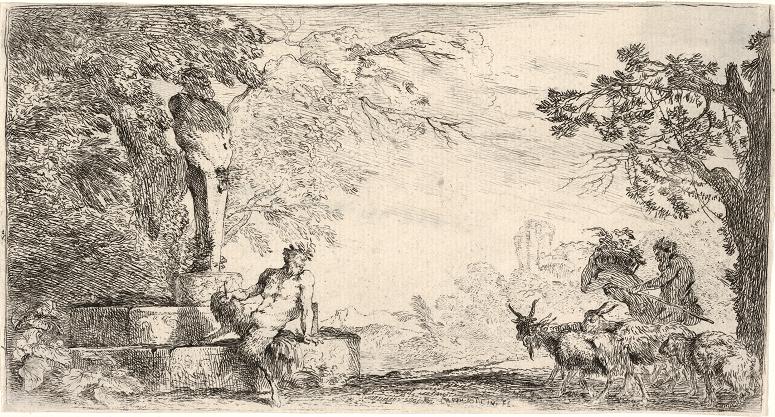Priapus. In Greek mythology, Priapus was a minor rustic fertility god, protector of livestock, fruit plants, gardens and male genitalia. Priapus is marked by his oversized, permanent erection, which gave rise to the medical term priapism. He became a popular figure in Roman erotic art and Latin literature, and is the subject of the often humorously obscene collection of verse called the Priapeia. Priapus was described as the son of Aphrodite by Dionysus, or the son of Dionysus and Chione, perhaps as the father or son of Hermes, and the son of Zeus or Pan, depending on the source. According to legend, Hera cursed him with inconvenient impotence, ugliness and foul-mindedness while he was still in Aphrodite's womb, in revenge for the hero Paris having the temerity to judge Aphrodite more beautiful than Hera. The other gods refused to allow him to live on Mount Olympus and threw him down to Earth, leaving him on a hillside. He was eventually found by shepherds and was brought up by them. Priapus joined Pan and the satyrs as a spirit of fertility and growth, though he was perennially frustrated by his impotence. In a ribald anecdote told by Ovid, he attempted to rape the goddess Hestia but was thwarted by an ass, whose braying caused him to lose his erection at the critical moment and woke Hestia. The episode gave him a lasting hatred of asses and a willingness to see them destroyed in his honour. The emblem of his lustful nature was his permanent erection and his large penis. Another myth states that he pursued the nymph Lotis until the gods took pity on her and turned her into a lotus plant. The first extant mention of Priapus is in the eponymous comedy Priapus, written in the 4th century BC by Xenarchus. Originally worshipped by Greek colonists in Lampsacus in Asia Minor, the cult of Priapus spread to mainland Greece and eventually to Italy during the 3rd century BC. Lucian tells that in Bithynia Priapus was accounted as a warlike god, a rustic tutor to the infant Ares, who taught him dancing first and war only afterwards, Karl Kerenyi observed. Arnobius is aware of the importance accorded Priapus in this region near the Hellespont. Also, Pausanias notes: This god is worshipped where goats and sheep pasture or there are swarms of bees; but by the people of Lampsacus he is more revered than any other god, being called by them a son of Dionysus and Aphrodite. In later antiquity, his worship meant little more than a cult of sophisticated pornography. Outside his home region in Asia Minor, Priapus was regarded as something of a joke by urban dwellers. However, he played a more important role in the countryside, where he was seen as a guardian deity. He was regarded as the patron god of sailors and fishermen and others in need of good luck, and his presence was believed to avert the evil eye. Priapus does not appear to have had an organized cult and was mostly worshiped in gardens or homes, though there are attestations of temples dedicated to the god. His sacrificial animal was the ass, but agricultural offerings were also very common. Long after the fall of Rome and the rise of Christianity, Priapus continued to be invoked as a symbol of health and fertility. The 13th century Lanercost Chronicle, a history of northern England and Scotland, records a lay Cistercian brother erecting a statue of Priapus in an attempt to end an outbreak of cattle disease. In the 1980s, D. F. Cassidy founded the St. Priapus Church as a modern church centred on worship of the phallus. Priapus' iconic attribute was his priapism; he probably absorbed some pre-existing ithyphallic deities as his cult developed. He was represented in a variety of ways, most commonly as a misshapen gnome-like figure with an enormous erect phallus. Statues of Priapus were common in ancient Greece and Rome, standing in gardens. The Athenians often conflated Priapus with Hermes, the god of boundaries, and depicted a hybrid deity with a winged helmet, sandals, and huge erection. Another attribute of Priapus was the sickle which he often carries in his right hand.
more...










